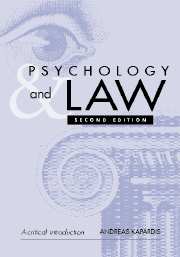Book contents
- Frontmatter
- Contents
- List of case studies
- Acknowledgements
- Foreword
- 1 Psycholegal research: an introduction
- 2 Eyewitnesses: key issues and event characteristics
- 3 Eyewitnesses: the perpetrator and interviewing
- 4 Children as witnesses
- 5 The jury
- 6 Sentencing as a human process
- 7 The psychologists as expert witnesses
- 8 Persuasion in the courtroom
- 9 Detecting deception
- 10 Witness recognition procedures
- 11 Psychology and the police
- 12 Conclusions
- Notes
- References
- Author index
- Subject Index
7 - The psychologists as expert witnesses
Published online by Cambridge University Press: 05 December 2011
- Frontmatter
- Contents
- List of case studies
- Acknowledgements
- Foreword
- 1 Psycholegal research: an introduction
- 2 Eyewitnesses: key issues and event characteristics
- 3 Eyewitnesses: the perpetrator and interviewing
- 4 Children as witnesses
- 5 The jury
- 6 Sentencing as a human process
- 7 The psychologists as expert witnesses
- 8 Persuasion in the courtroom
- 9 Detecting deception
- 10 Witness recognition procedures
- 11 Psychology and the police
- 12 Conclusions
- Notes
- References
- Author index
- Subject Index
Summary
‘The law is hostage to the knowledge possessed by others; it needs data, good data. It can well do without the biases and prejudices of related disciplines – it has enough of its own to deal with.’ (Allen and Miller, 1995:337)
‘The use of expert witnesses in the courtroom has entered a dynamic era. Over the course of the next decade a great deal is likely to happen.’ (Landsman, 1995:157)
‘Expert witnesses do not just appear out of the blue. They are recommended by a city's “old boy” network over lunches, telephone calls and drinks. Or they are tried out by legal firms and insurance companies and, if successful, put on to their “panels” of suitable experts.’ (Ragg, 1995)
‘Psychology can play a valuable role in the criminal process, even if it must end at the door of the court.’ (Sheldon and McCleod, 1991:820)
‘greater numbers of expert witnesses are being permitted to testify on a broader base of subject matter than has hitherto been permitted.’ (Freckelton and Selby, 2002:12).
Introduction
Experts, in the form of medical doctors, appear to have been first called upon to advise judges at the Old Bailey six hundred years ago, but it was not until around 1620 that a jury was furnished with expert testimony for the first time. By 1721 there was the first challenge to an expert witness (a surgeon) testifying for the prosecution by another expert testifying on behalf of the defendant (Landsman, 1995).
- Type
- Chapter
- Information
- Psychology and LawA Critical Introduction, pp. 184 - 207Publisher: Cambridge University PressPrint publication year: 2002



